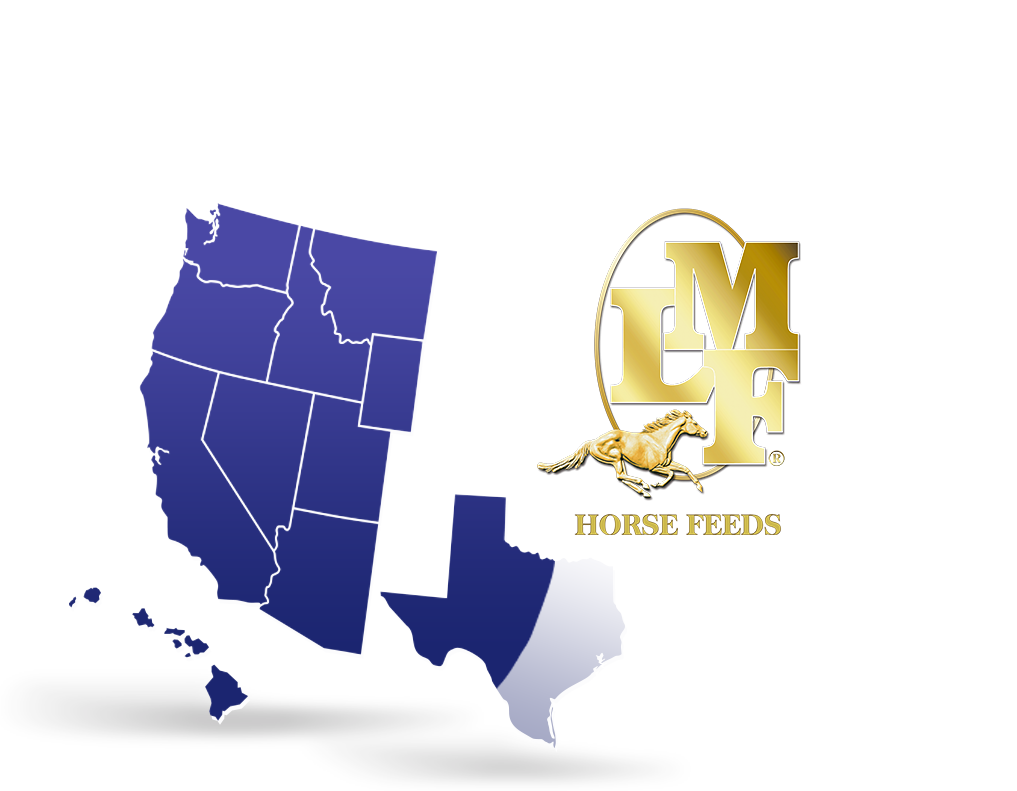Feeding the Pleasure Horse
“Light Pleasure Riding / Maintenance”
Horses that are kept for pleasure or occasional riding are typically easy keepers and can be fed a simple maintenance diet. Maintenance is a component of all physiological states, defined as no net gain or loss of any nutrients. The nutrients required for maintenance are utilized for daily body functions, such as: metabolism during rest (heart function, breathing, digestion, and nervous tissue function), activity for maintenance (walking to food/water, grazing), and temperature regulation.
Horses at maintenance include those kept in pasture and those occasionally used for work for short periods of time. The energy requirement for maintenance is low and can often be met with good-quality forage. Typically, grain supplementation is not needed. Supplementation with salt or vitamins and minerals may be necessary based on the nutritional value of the forages. Mature grass forages may also lack adequate protein, so a protein supplement may be added to the daily ration. The mature horse at maintenance has comparatively low nutrient requirements when compared to growing horses, working horses, and broodmares. The 1100lb horse can comfortably consume 2.0-2.5% of his body weight in feed. Obesity can be a problem with the maintenance horse due to possible overfeeding and lack of exercise. Mature maintenance or pleasure horses should be maintained at a condition score of 5-6 (scale 1-9).
Some pleasure horses are easy keepers and maintain weight easily and become obese on average amounts of feedstuffs. Owners of these types of horses should take the following precautions
1. Limit pasture grazing time. This is especially true in spring and early summer, when pasture growth is most rapid. If this is not possible, the horse should wear a grazing muzzle.
2. Don’t feed high-fat supplements. Vegetable oil, flaxseed and rice bran are high in fat and so are high in calories. Eliminate these supplements from your horse’s diet and you can cut out some calories and prevent excessive weight gain.
3. Eliminate high-calorie grain concentrates. Most concentrates or grain-based feeds are formulated for a minimum feeding rate of 0.5% of body weight (5 lb daily for an 1100lb horse) to provide the proper amount of required vitamins and minerals. This amount of feed usually provides an excessive amount of calories for an easy keeper. LMF Super Supplement is a low intake (1lb for 1000lb horse at maintenance), low calorie and low starch, vitamin and mineral fortified supplement in a pelleted form that supplies the missing nutrients for a horse consuming only hay or pasture.
4. Start an exercise program. If your horse is not involved in light activity, the best type of exercise for any type of horse is of low intensity and long duration. The main purpose of exercise is to increase energy expenditure or calorie loss. Other benefits of daily exercise include an increase in metabolic rate, a possible reduction in appetite, and prevention of bone and mineral losses that may occur during calorie restriction when the horse is inactive.
5. Replace alfalfa hay with grass hay. Alfalfa hay contains more calories per lb than grass hays.
6. If horses are stabled or have no grass access, limit the amount of hay fed and divide it into several daily feedings. Horses are designed to graze continuously; therefore the capacity of the stomach is limited. This behavior also ensures that stomach acid is buffered by saliva and ingested plant material. Infrequent meals can result in gastric ulceration due to constant exposure of the stomach wall to acid. Divide the amount of hay fed into 3 or 4 daily meals to increase meal frequency along with salivation and stomach fill to prevent ulcer formation. Limit the amount of hay fed to 1.5% of body weight, this is enough to ensure maintenance and proper digestive function. If the horse’s body condition is still excessive after weight loss has stabilized, then decrease the feeding rate of hay to 1.25% of body weight or less and continue feeding management for weight loss.
7. Monitor body weight regularly using a livestock scale or weight tape. Monitor body fatness using the body condition scoring system. Most people do not have access to livestock scales and therefore need to find more accessible methods of estimating weight. A weight tape is very useful for this and can usually be found in most feed stores. If you do not have a weight tape you can also use a simple measuring tape. Measure the heart girth, then measure the length of the horse from the point of the shoulder to the point of the buttock. Input this data into the weight calculator on the LMF website https://lmffeeds.com/nutrition/calculator/
Body Condition Scoring (BCS) is also a useful tool when managing horses and in particular deciding on the right feed choice. Body condition scoring involves the palpation and visual assessment of the degree of fatness of various areas of the horse, such as: over the ribs, tail head area, neck and withers, and behind the shoulders. The scoring system uses a numeric scale of 1 to 9 where 1 is emaciated and 9 is obese. Regular condition scoring of your horse will help in deciding if your horse needs to gain, lose or just maintain weight. https://lmffeeds.com/nutrition/scoring/
If your horse needs a little extra feed when undergoing light pleasure riding, consider feeding LMF Gentle Balance. This is a palatable pelletized feed that provides a balanced nutritional diet suitable for horses and ponies at maintenance or in light to moderate work.
If your horse prefers a textured feed, try LMF Showtime. Showtime is a palatable feed, formulated for mature horses providing the necessary digestible energy along with soluble fiber, quality protein and balanced levels of vitamins and minerals for optimal health and vitality.
As horses age and end their performance life they are often retired to a life of occasional pleasure riding. If these older horses begin to show signs of dental deterioration e.g. weight loss, feed falling out of their mouth, balls of feed on the ground around the feed tub then a senior horse feed may be required. LMF Senior Low Carb is a pelleted feed designed for senior horses that require special nutritional attention due to decreases in metabolic and digestive efficiencies that accompany the ageing process. Taking these changes into consideration, LMF Senior Low Carb provides higher levels of nutrients that are essential to maintain health, body condition and general well-being in older horses.
Typically pleasure horses are not stabled regularly and may not have access to blankets in the winter months. Don’t be afraid to adjust your horse’s diet to account for the extra calories burned to stay warm during the winter. If your horse does well on LMF Super Supplement during the warmer months but losses a little condition during the colder weather you can change them to LMF Gentle Balance, LMF Showtime or LMF Senior Low Carb to help them maintain in the winter. Another simple method for keeping horses warm in the winter time is feeding plenty of forage. When the bacteria in the hindgut breakdown fiber they produce heat which keeps the horse warm from the inside out.
Summary
Forage should make up the largest portion of the pleasure or maintenance horses diet. Additional vitamins and minerals and possibly protein may need to be fed based on the quality of forage provided and the nutrients that may be lacking. Remember that horses are individuals and vary greatly in their requirements for energy. Some horses become over weight when fed according to the guidelines while others lose weight. Therefore, monitor each individual horse’s condition constantly and feed each one accordingly. Working with a nutritionist is recommended to make sure the horse is provided with exactly the right nutrients to obtain the best performance possible. Contact LMF to speak with a nutritionist and arrange a diet evaluation for your horse.

Available Across the West.
Distributed throughout the Northwest, Southwest, Hawaii and Texas.
Find a Dealer Near You
